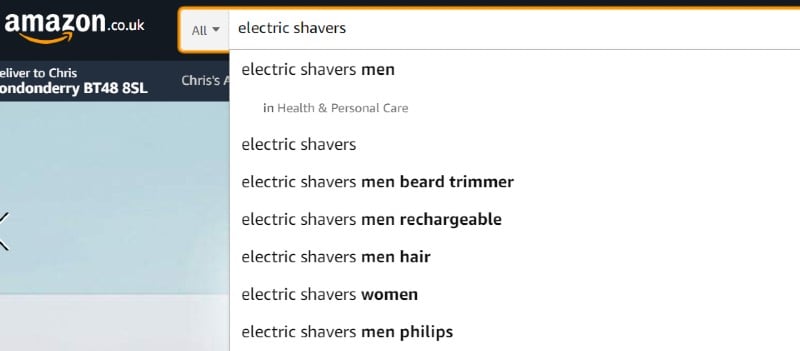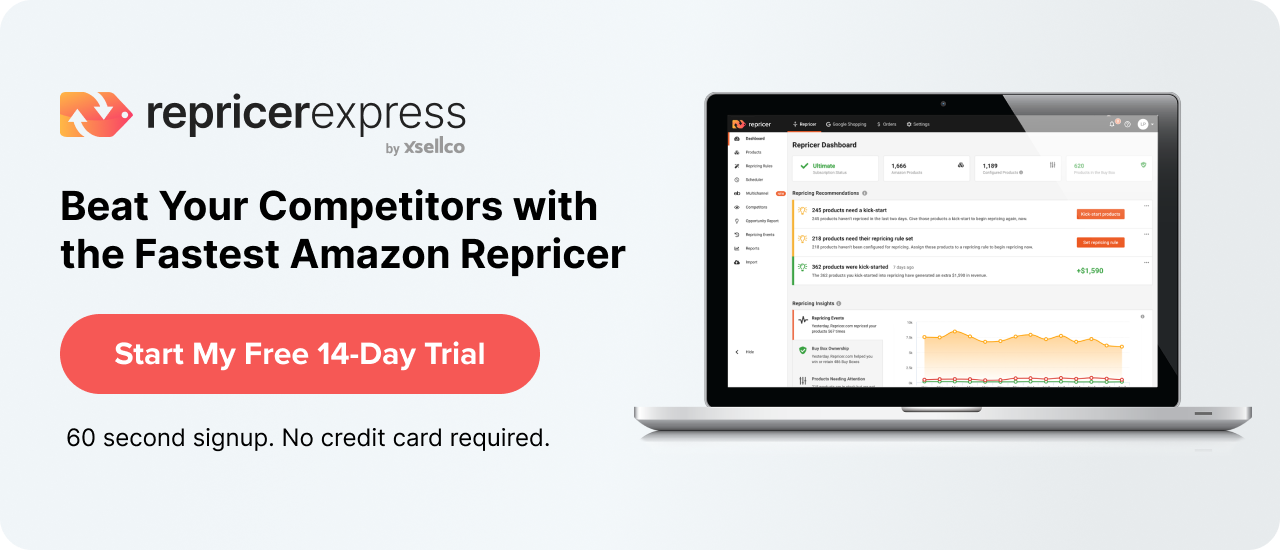How do your potential customers find your products for sale on Amazon? They search for them. How do they search for them? By typing what they are searching for into the Amazon search bar of course. This is why Amazon keyword research is one of the most important aspects of selling on Amazon.
It’s easy to forget that Amazon is in fact, a search engine and so it behaves like a search engine. It indexes information and uses numerous factors to determine which products on the site rank over others in the search results.
Amazon will always make sure that all products shown to potential customers are those most relevant to their search. And they do this because, of course, Amazon wants as many sales as possible through its ecommerce platform. This is why the most relevant, and in fact, the highest converting products are the ones that rank the best in the search results.
When someone searches with a specific keyword on Amazon and then purchases your product, the Amazon A9 algorithm understands that the customer has found what they are looking for using the original keyword or keyphrase they used in their search. This means that your product is seen as highly relevant and will then appear more frequently and rank higher in the search results.

Showcase Your Product As Relevant
The one thing that Amazon is not going to do is return search results full of irrelevant products because then searchers won’t become customers!
So, you must showcase your product as being ‘relevant’ and to do this, your product title has to be on-point. This is one of the most critical factors in your success as an Amazon seller.
However, ‘relevant’ doesn’t mean anything unless it is ‘relevant’ to the search query typed by a potential customer. So, your product title should contain keywords relevant not only to your product but also to the search terms your target buyer will use on Amazon.
If this sounds complicated, don’t be alarmed, because it’s really not once you get your head around keywords, the proper research of those keywords and how they can have a significant impact on your Amazon sales when used correctly. Amazon keyword research is the single most crucial task you should undertake when you sell on Amazon.
But, do you have a strategy for maximising your relevance on Amazon?
If you don’t, you should, because keyword optimization is how people will find your products and purchase from you. If they can’t find you, you won’t make sales. It’s as simple as that.
What if you target the wrong keywords?
There’s no point in adding a random jumble of keywords to your product listing. In doing so, your products will rank lower in the search results because they will be deemed irrelevant to buyers based on their search queries and so you are unlikely to make sales. If you don’t make sales, your ranking will drop even lower until you may as well be completely invisible.
How Do You Find the Most Relevant Amazon Keywords?
First up, here’s a crucial tip. Your most important and relevant keywords should always appear first in your product titles. The reason for this is that consumers like to ‘scan’. They will always take shortcuts and will rarely read a product title in full. So, to make sure you hammer home the relevance of your product at first glance, add your important keywords first.
Product type. Features. Size. Colour. Quantity.
You’ll notice ‘brand name’ is not mentioned here but that doesn’t mean it’s not important. Just that you should only add your brand name first if your brand is well established and recognisable to buyers.
The key is to make the search process easy for consumers so that it’s simple for them to purchase.
So, the importance of using researched keywords is evident. But how do you find the best keywords to use in your product listing?
How to Conduct Amazon Keyword Research

There are plenty of Amazon Keyword Research tools out there – more on those later – but there are also some hugely successful keyword research strategies you can adopt which are absolutely free.
1. Free Amazon Keyword Research…on Amazon!
This is by far the easiest and cheapest way to start your Amazon keyword research.
Put yourself in the position of an Amazon buyer for a moment. When you start typing a search term into the search bar, you’ll notice that suggestions pop up which are auto-completed by Amazon and are in fact a goldmine of keyword information.
For example, a search for ‘toothbrush holder’ returns nine suggestions ranging from toothpaste holder to toothpaste holder ceramic.
If you are the seller of toothbrush holders, you can now see those relevant and important keywords required within your title if applicable include ‘bathroom’, ‘wall mounted’, ‘kids’, ‘suction’ and so on.
How simple is that!
But, let’s take it one step further.
Here’s a tip which will super-charge this Amazon keyword research strategy.
Now, this part isn’t free. However, it will only cost you £10 on a pay as you go basis for 100,000 credits (1 credit = 1 keyword) so it won’t break the bank and is definitely worth using for a better insight into your Amazon Keyword Research.
Keywords Everywhere is an extension which you can add to your Chrome or Firefox browser and will show you search volumes and statistics for keywords. That includes keywords searched for via Amazon, Google, in fact, anywhere that you search online.

So, the same search on Amazon with Keywords Everywhere enabled shows the actual volume of searches for each of those keywords previously returned.
Now you can see the top-performing keywords and even their cost per click (CPC) at a glance.
This data is based on Google searches so you should use these metrics only as an indicator of the popularity of a keyword and combine this method with other Amazon keyword research techniques.
Speaking of which, here’s another one.
2. Free Amazon Keyword Research Using Keywordtool.io

The Keywordtool.io tool allows you to research Amazon keywords using Google autocomplete. Much like Amazon autocomplete, you can generate popular and relevant keywords simply by typing the product that you are selling into the search bar.
The free version doesn’t allow you to see search volumes and won’t work with Keywords Everywhere, but it does give you further keyword ideas to potentially use in your product titles.
You’ll notice that there is also an ‘Amazon’ search option. This is useful for comparing the keywords returned with your earlier Amazon autocomplete search.
So, now you have two tools that can provide you with Amazon keyword research for free or at a very low cost.
What’s next?
3. Free Amazon Keyword Research by Targeting Complementary Products
Have you ever noticed the information at the bottom of an Amazon listing that states: “Frequently Bought Together”?
Although the keywords for complementary products won’t target people who are directly searching for your product, they will offer an insight into the search behaviour of potential customers who could be interested in your product.
The keywords you can glean from this type of research are suitable for use, not in your title, but in your Amazon bullet points, product description and also in your backend keywords (the hidden keywords you can add within the settings of your product listing).
Not all Amazon listings have this section, but it’s always worth scrolling down the page to check.
Now for a couple of ‘paid for’ alternatives for your Amazon keyword research.
As much as we all love a freebie, it would be silly not to also use a paid for keyword research tool. The data you mine from the paid for software will be more in-depth and accurate and so should be included in your Amazon keyword research strategy.
Best Amazon Keyword Research Tools
Option 1: Sonar by Sellics
Sonar helps you uncover the most profitable keywords in your niche, shows which of your competitors are ranking for those keywords and also how they have achieved that ranking. That’s pretty comprehensive data, and that’s why a paid service like this is a requirement alongside the free options available to you.
You’ll be able to view a specific keyword’s search volume by month on Amazon and all the related keywords making it dead easy for you to level with any established competition.
Option 2: Helium 10
A second option is Helium 10, a keyword research tool which allows you to search any keyword and get thousands of related keywords returned in your results. All of these also include highly accurate search volume information.
The software allows you to browse relevant keywords and compile a bespoke list – your ‘seed’ list (more on that shortly) – which you can then analyse to work out which keywords to include in your Amazon product listing title and which keywords to use elsewhere in your listing.
So, now you have five ways to start your Amazon keyword research. But what exactly should you do with this research, and how do you use those keywords to your advantage?
How to Choose the Best Keywords to Use on Amazon
First, you should choose Your ‘seed keywords’ using the free and paid for Amazon keyword research tools suggested.
Your ‘seed keywords’ are a small selection of keywords which are most relevant to your product. They are usually short but highly descriptive. For example, using the toothbrush holder product, if you are selling a Wall Mounted Chrome Toothbrush Holder your seed keywords might be: Toothbrush Holder Wall Mounted
This is your starting point and allows you to keep in mind what your potential buyers will actually be searching for. From there, you can generate further relevant keywords using your Amazon keyword research tools and add these to your title, bullet points, main description and backend sections.
You’ll then need to dig deep to find other relevant keywords that Amazon buyers will type into the search box when they are looking for your product.
This is where the more accurate data from the paid for tools comes in because you need to know precisely what your customers are searching for and require more accurate data.
As you go through the list of keywords returned, you should always be thinking like a buyer. Ask yourself:
“Would I type this keyword into the search if I was looking for my product?”
Any keywords which are not relevant to your product must be dismissed immediately, even if it’s a popular keyword. It’s no use to you unless it is totally relevant to your product. For example, if you discover that ‘toothpaste dispenser’ is a popular keyword, although it loosely relates to your toothbrush holder product, it is not entirely relevant because it’s not what you sell, so unsuitable for use in your title.
Even if by using this keyword you end up with a high ranking, searchers are unlikely to purchase your product. They will be looking for a wall mounted toothbrush holder, not a toothpaste dispenser, so you will have enticed them to your product under false pretences, and your ranking will actually drop.
This keyword could, however, be used in your backend hidden keywords or bullet points as it is a complementary product.
Remember: Your title keywords are super important and must be highly relevant to the product you are selling.
Once you have your final list of highly relevant keywords, add as many into your product listing as you can.
You must make full use of all the places where you can include keywords.
- Your title
- Bullet points
- Product description
- Backend search terms
While your title does not have to read like a sentence and should only include your keywords, your bullet points and product description should read as proper persuasive sentences to avoid making it difficult for your customers to read. You want to make it as easy as possible for them to purchase from you.
By paying proper attention to your Amazon keyword research and adding only highly relevant keywords to your title and description you will now start to rank for those keywords. You will, however, still need to make initial sales to rise through the rankings even further.
Final Thoughts
With so many online buyers heading straight to Amazon, you can’t afford not to complete proper Amazon keyword research. Understanding how your customers search for products is key to ranking higher and selling more.
Of course, there are other factors you must take into account when it comes to producing a successful Amazon product listing. Your keywords are a massive part of this but don’t forget to also take into account your images, reviews and product pricing. These all need to be just as or more attractive than your competitors to assist you in keeping your product ranking after all your hard work on your keywords.
With a good Amazon keyword research strategy, you can become highly visible to your exact target audience and boost click and sales.
So, experiment with the keyword research tools at your disposal. Combine the paid and free versions to confidently undertake your Amazon keyword research and ensure you are consistently putting your products in front of potential customers on Amazon.



